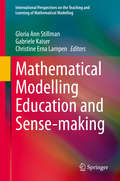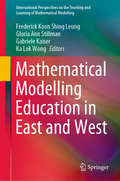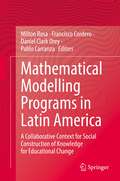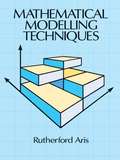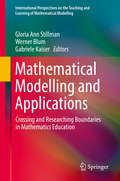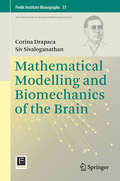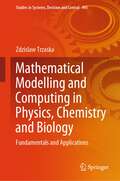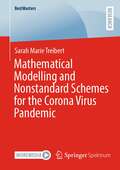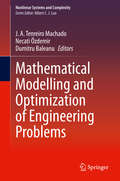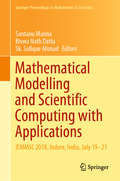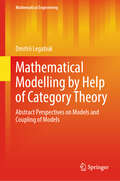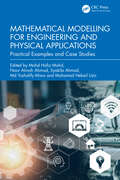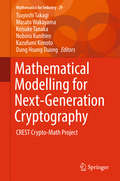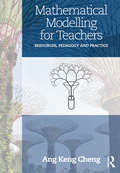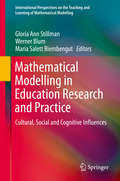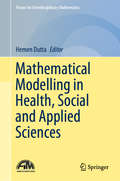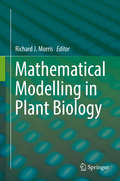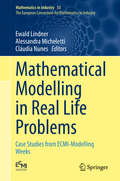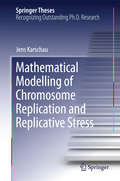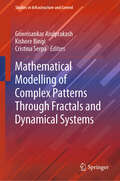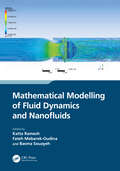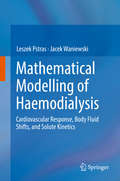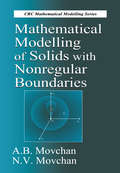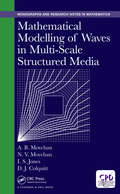- Table View
- List View
Mathematical Modelling Education and Sense-making (International Perspectives on the Teaching and Learning of Mathematical Modelling)
by Gabriele Kaiser Gloria Ann Stillman Christine Erna LampenThis volume documents on-going research and theorising in the sub-field of mathematics education devoted to the teaching and learning of mathematical modelling and applications. Mathematical modelling provides a way of conceiving and resolving problems in people’s everyday lives as well as sophisticated new problems for society at large. Mathematical modelling and real world applications are considered as having potential for cultivating sense making in classroom settings. This book focuses on the educational perspective, researching the complexities encountered in effective teaching and learning of real world modelling and applications for sense making is only beginning. All authors of this volume are members of the International Community of Teachers of Mathematical Modelling (ICTMA), the peak research body into researching the teaching and learning of mathematical modelling at all levels of education from the early years to tertiary education as well as in the workplace.
Mathematical Modelling Education in East and West (International Perspectives on the Teaching and Learning of Mathematical Modelling)
by Gabriele Kaiser Gloria Ann Stillman Frederick Koon Shing Leung Ka Lok WongThis book documents ongoing research and theorizing in the sub-field of mathematics education devoted to the teaching and learning of mathematical modelling and applications. Mathematical modelling provides a way of conceiving and resolving problems in people’s everyday lives as well as sophisticated new problems for society at large. Mathematical tradition in China that emphasizes algorithm and computation has now seen a renaissance in mathematical modelling and applications where China has made significant progress with its economy, science and technology. In recent decades, teaching and learning of mathematical modelling as well as contests in mathematical modelling have been flourishing at different levels of education in China. Today, teachers and researchers in China become keener to learn from their colleagues from Western countries and other parts of the world in research and teaching of mathematical modelling and applications. The book provides a dialogue and communication between colleagues from across the globe with new impetus and resources for mathematical modelling education and its research in both West and East with new ideas on modelling teaching and practices, inside and outside classrooms.All authors of this book are members of the International Community of Teachers of Mathematical Modelling and Applications (ICTMA), the peak research body into researching the teaching, assessing and learning of mathematical modelling at all levels of education from the early years to tertiary education as well as in the workplace. The book is of interest to researchers, mathematics educators, teacher educators, education administrators, policy writers, curriculum developers, professional developers, in-service teachers and pre-service teachers including those interested in mathematical literacy.
Mathematical Modelling Programs in Latin America: A Collaborative Context for Social Construction of Knowledge for Educational Change
by Milton Rosa Daniel Clark Orey Francisco Cordero Pablo CarranzaThis book is about the unique, sophisticated, and rigorous study of mathematics in Latin America developed over centuries of cultural exchange between Europe, North, and South America. More specifically, the book explores the tradition of mathematical modelling, introduced a century ago. This modelling was adapted to assist members of distinct communities to draw information about their own realities through the elaboration of representations, which generate mathematical knowledge that deals with creativity and invention. The book provides empirical evidence that a category of mathematical modelling developed in Latin America assesses the horizontal and reciprocal relations between mathematics (school/non-school contexts) and the real world. These relations provide an epistemological and ontological change, where mathematical knowledge of the others is recognized on a horizontal plane. Further, they oblige mathematics teachers and students to understand as a community of knowledge that builds their own mathematical categories of their environment governed by the reciprocal relationships between academic knowledge and functional knowledge. The dimensions of the relationships make up a frame of reference that guides educational change in mathematics. The book presents an inquiry-based approach of three Latin American modelling programs: ethnomodelling, transversality of knowledge, and reasoned decision-making. Each one, with its respective theoretical and methodological foundations related to ethnomathematics and mathematical modelling, socioepistemology, and the attribution of meaning to learning. Undoubtedly, the three mathematical modelling programs, independently, provide educational gains, each with its levels of specificity and loyal to its philosophical, theoretical, and methodological principles. However, the book places them together, organized by axes, to define a corpus of mathematical knowledge that envisions profound educational change through the development of different approaches of mathematical modelling. The authors of the 18 chapters in this book, who represent the diversity of Latin America, are from eight countries: Argentina, Brazil, Chile, Colombia, Costa Rica, Cuba, Ecuador, Honduras, and Mexico. They were invited to share their ideas, perspectives, and discuss investigations that represent a rich sample of three Latin American perspectives on mathematical modelling.
Mathematical Modelling Techniques (Dover Books on Computer Science)
by Rutherford Aris"Engaging, elegantly written." -- Applied Mathematical ModellingMathematical modelling is a highly useful methodology designed to enable mathematicians, physicists and other scientists to formulate equations from a given nonmathematical situation. In this elegantly written volume, a distinguished theoretical chemist and engineer sets down helpful rules not only for setting up models but also for solving the mathematical problems they pose and for evaluating models.The author begins with a discussion of the term "model," followed by clearly presented examples of the different types of models (finite, statistical, stochastic, etc.). He then goes on to discuss the formulation of a model and how to manipulate it into its most responsive form. Along the way Dr. Aris develops a delightful list of useful maxims for would-be modellers. In the final chapter he deals not only with the empirical validation of models but also with the comparison of models among themselves, as well as with the extension of a model beyond its original "domain of validity."Filled with numerous examples, this book includes three appendices offering further examples treated in more detail. These concern longitudinal diffusion in a packed bed, the coated tube chromatograph with Taylor diffusion and the stirred tank reactor. Six journal articles, a useful list of references and subject and name indexes complete this indispensable, well-written guide."A most useful, readable-and stimulating-book, to be read both for pleasure and for enlightenment." -- Bulletin of the Institute of Mathematics and Its Applications
Mathematical Modelling and Applications
by Gabriele Kaiser Werner Blum Gloria Ann StillmanThis volume documents on-going research and theorising in the sub-field of mathematics education devoted to the teaching and learning of mathematical modelling and applications. Mathematical modelling provides a way of conceiving and resolving problems in the life world of people whether these range from the everyday individual numeracy level to sophisticated new problems for society at large. Mathematical modelling and real world applications are considered as having potential for multi-disciplinary work that involves knowledge from a variety of communities of practice such as those in different workplaces (e. g. , those of educators, designers, construction engineers, museum curators) and in different fields of academic endeavour (e. g. , history, archaeology, mathematics, economics). From an educational perspective, researching the development of competency in real world modelling involves research situated in crossing the boundaries between being a student engaged in modelling or mathematical application to real word tasks in the classroom, being a teacher of mathematical modelling (in or outside the classroom or bridging both), and being a modeller of the world outside the classroom. This is the focus of many of the authors of the chapters in this book. All authors of this volume are members of the International Community of Teachers of Mathematical Modelling (ICTMA), the peak research body into researching the teaching and learning of mathematical modelling at all levels of education from the early years to tertiary education as well as in the workplace.
Mathematical Modelling and Biomechanics of the Brain (Fields Institute Monographs #37)
by Corina Drapaca Siv SivaloganathanThis monograph aims to provide a rigorous yet accessible presentation of some fundamental concepts used in modeling brain mechanics and give a glimpse of the insights and advances that have arisen as a result of the nascent interaction of the mathematical and neurosurgical sciences. It begins with some historical perspective and a brief synopsis of the biomedical/biological manifestations of the clinical conditions/diseases considered. Each chapter proceeds with a discussion of the various mathematical models of the problems considered, starting with the simplest models and proceeding to more complex models where necessary. A detailed list of relevant references is provided at the end of each chapter. With the beginning research student in mind, the chapters have been crafted to be as self-contained as possible while addressing different clinical conditions and diseases. The book is intended as a brief introduction to both theoreticians and experimentalists interested in brain mechanics, with directions and guidance for further reading, for those who wish to pursue particular topics in greater depth. It can also be used as a complementary textbook in a graduate level course for neuroscientists and neuroengineers.
Mathematical Modelling and Computing in Physics, Chemistry and Biology: Fundamentals and Applications (Studies in Systems, Decision and Control #495)
by Zdzislaw TrzaskaThis book keeps an eye in the direction of applications of advanced and high performance scientific computing in describing the behavior of natural and constructed systems, e.g. chaos, bifurcation, fractal, Lyapunov exponent, period doubling, Poincaré map, strange attractor etc. With the aid of powerful computers the modem theory of chaos and its geometry, the fractals, and attractors are developed. The concepts of object oriented computing are introduced early in the text and steadily expanded as one progresses through the chapters. The beginning of each chapter is of an introductory nature, followed by practical applications, the discussion of numerical results, theoretical investigations on nonlinear stability and convergence. This is the first complete introduction to process modelling and computing that fully integrates software tools — enabling professionals and students to master critical techniques hands on through computer simulations based on the popular MATLAB environment. The book offers a simple tool for all those oscillations that are travelling through the world, helping them discover its hidden beauty. Many applications as well as results of computer simulations are presented. The center of concern is set on existing as well as emerging continuous methods of investigations useful for researchers, engineers and practitioners active in many and often interdisciplinary fields, where physics, electrochemistry, biology and medicine play a key role. Coverage includes: • Dynamic behavior of nonlinear systems, • Fundamental descriptions of processes exhibiting nonlinear oscillations, • Mechanism and function of structures of nonlinear oscillations’ patterns, • Analysis of dynamical oscillations in electric circuits and systems, • Artificial intelligence models of natural systems, • Nonlinear oscillations in chemistry, biology and medicine, • Oscillations in mechanics and transport systems, • Oscillations in fractional-order systems, • Energy harvesting systems from the surrounding environment. With an insatiable appetite for exploring the surrounding world and doing research, this book can help readers quickly find ways to use new computers and facilitate the quest for greater knowledge and understanding of reality. The reach of novelty of the book ranges from new mathematical ideas to motivating questions and science issues in many subject areas.
Mathematical Modelling and Nonstandard Schemes for the Corona Virus Pandemic (BestMasters)
by Sarah Marie TreibertThis book deals with the prediction of possible future scenarios concerning the COVID-19 pandemic. Based on the well-known SIR model by Kermack and McKendrick a compartment model is established. This model comprises its own assumptions, transition rates and transmission dynamics, as well as a corresponding system of ordinary differential equations. Making use of numerical methods and a nonstandard-finite-difference scheme, two submodels are implemented in Matlab in order to make parameter estimations and compare different scenarios with each other.
Mathematical Modelling and Optimization of Engineering Problems (Nonlinear Systems and Complexity #30)
by Dumitru Baleanu J. A. Tenreiro Machado Necati ÖzdemirThis book presents recent developments in modelling and optimization of engineering systems and the use of advanced mathematical methods for solving complex real-world problems. It provides recent theoretical developments and new techniques based on control, optimization theory, mathematical modeling and fractional calculus that can be used to model and understand complex behavior in natural phenomena including latest technologies such as additive manufacturing. Specific topics covered in detail include combinatorial optimization, flow and heat transfer, mathematical modelling, energy storage and management policy, artificial intelligence, optimal control, modelling and optimization of manufacturing systems.
Mathematical Modelling and Scientific Computing with Applications: ICMMSC 2018, Indore, India, July 19–21 (Springer Proceedings in Mathematics & Statistics #308)
by Santanu Manna Biswa Nath Datta Sk. Safique AhmadThis book contains original research papers presented at the International Conference on Mathematical Modelling and Scientific Computing, held at the Indian Institute of Technology Indore, India, on 19–21 July 2018. Organized into 30 chapters, the book presents the recent progress and the most advanced innovations, trends, and real-world challenges encountered and solutions embraced in the applications of mathematics and scientific computing. The book will be of interests to a wide variety of researchers, students and the practicing engineers working in diverse areas of science and engineering, ranging from applied and computational mathematics, vibration problem, computer science, and numerical optimization to physics, chemistry, biology, electrical, civil, mechanical, chemical, seismology, aerospace, and medical sciences. The aim of the conference is to bring together leading academicians, scientists, researchers, engineers, and industry partners from all over the globe to exchange and share their experiences and research results on various aspects of applied mathematics and scientific computation, like, differential equation, modeling, simulation, dynamical systems, numerical analysis, matrix theory, inverse problems, and solid and fluid mechanics, computational engineering.
Mathematical Modelling by Help of Category Theory: Abstract Perspectives on Models and Coupling of Models (Mathematical Engineering)
by Dmitrii LegatiukThis monograph offers a novel structural perspective on the modelling of engineering problems, utilizing abstract mathematics in the form of category theory. Specifically, the book aims to enhance the understanding of mathematical modelling by developing a category theory-based framework. Category theory is employed to establish clear relationships between mathematical models and their complexities. The theory is then extended to encompass coupled mathematical models, incorporating more advanced categorical structures. To bridge theory and practice, the book presents engineering applications of the abstract categorical framework, providing various modelling examples from real-world engineering scenarios. Additionally, it introduces initial concepts for automatic model generation and error detection in modelling. The theory developed here demonstrates the practical utility of category theory, making this book a valuable resource for researchers in applied mathematics and engineering, particularly those focused on theoretical foundations of modelling.
Mathematical Modelling for Engineering and Physical Applications: Practical Examples and Case Studies
by Mohd Hafiz Mohd Md Yushalify Misro Syakila Ahmad Noor Atinah Ahmad Mohamad Hekarl UzirThis edited volume from mathematical modelling experts employs a structured approach to showcase the latest research and provide a comprehensive guide to the principles, techniques and practical applications of mathematical modelling in the fields of engineering and the physical sciences.Readers will gain an insight into the fundamentals of mathematical modelling, its application in engineering and the physical sciences, recent advances in the field, real-world case studies and challenges and future directions in the field. The book first introduces readers to the fundamentals of mathematical modelling, including the definition, scope and steps involved in the modelling process. Mathematical tools and techniques relevant to modelling are explained. The book then addresses the application of mathematical modelling in engineering and the physical sciences. It covers various domains, such as mechanical, biomedical, chemical, computer and environmental engineering, as well as green energy, physics and other physical science applications. Furthermore, the book explores the integration of data-driven approaches, leveraging the power of big data and analytics to enhance modelling capabilities. Through real-life case studies, readers gain practical insights into how mathematical modelling is applied in various industries and scientific disciplines. These case studies analyse the modelling process, challenges faced and outcomes achieved. Readers will gain a solid foundation to develop effective mathematical models and apply them to solve complex engineering and physical problems. This foundation will also enable them to tackle problems and make informed decisions in their own projects. Finally, readers will be able to anticipate and adapt to evolving technologies and stay ahead in their respective fields.This book is a valuable resource primarily for undergraduate and graduate students seeking a comprehensive guide to this important discipline. Researchers, engineers and scientists will also benefit from the discussions within. Overall, the book empowers readers with the knowledge, skills and practical insights to effectively apply mathematical modelling in engineering and the physical sciences.
Mathematical Modelling for Next-Generation Cryptography
by Tsuyoshi Takagi Masato Wakayama Keisuke Tanaka Noboru Kunihiro Kazufumi Kimoto Dung Hoang DuongThis book presents the mathematical background underlying security modeling in the context of next-generation cryptography. By introducing new mathematical results in order to strengthen information security, while simultaneously presenting fresh insights and developing the respective areas of mathematics, it is the first-ever book to focus on areas that have not yet been fully exploited for cryptographic applications such as representation theory and mathematical physics, among others. Recent advances in cryptanalysis, brought about in particular by quantum computation and physical attacks on cryptographic devices, such as side-channel analysis or power analysis, have revealed the growing security risks for state-of-the-art cryptographic schemes. To address these risks, high-performance, next-generation cryptosystems must be studied, which requires the further development of the mathematical background of modern cryptography. More specifically, in order to avoid the security risks posed by adversaries with advanced attack capabilities, cryptosystems must be upgraded, which in turn relies on a wide range of mathematical theories. This book is suitable for use in an advanced graduate course in mathematical cryptography, while also offering a valuable reference guide for experts.
Mathematical Modelling for Teachers: Resources, Pedagogy and Practice
by Keng Cheng AngMathematical Modelling for Teachers: Resources, Pedagogy and Practice provides everything that teachers and mathematics educators need to design and implement mathematical modelling activities in their classroom. Authored by an expert in Singapore, the global leader in mathematics education, it is written with an international readership in mind. <P><P>This book focuses on practical classroom ideas in mathematical modelling suitable to be used by mathematics teachers at the secondary level. As they are interacting with students all the time, teachers generally have good ideas for possible mathematical modelling tasks. However, many have difficulty translating those ideas into concrete modelling activities suitable for a mathematics classroom. In this book, a framework is introduced to assist teachers in designing, planning and implementing mathematical modelling activities, and its use is illustrated through the many examples included. Readers will have access to modelling activities suitable for students from lower secondary levels (Years 7 and 8) onwards, along with the underlying framework, guiding notes for teachers and suggested approaches to solve the problems. The activities are grouped according to the types of models constructed: empirical, deterministic and simulation models. Finally, the book gives the reader suggestions of different ways to assess mathematical modelling competencies in students.
Mathematical Modelling in Education Research and Practice
by Werner Blum Gloria Ann Stillman Maria Salett BiembengutIn this volume cultural, social and cognitive influences on the research and teaching of mathematical modelling are explored from a variety of theoretical and practical perspectives. The authors of the current volume are all members of the International Community of Teachers of Mathematical Modelling and Applications, the peak research body in this field. A distinctive feature of this volume is the high number of authors from South American countries. These authors bring quite a different perspective to modelling than has been showcased in previous books in this series, in particular from a cultural point of view. As well as recent international research, there is a strong emphasis on pedagogical issues including those associated with technology and assessment, in the teaching and learning of modelling. Applications at various levels of education are exemplified. The contributions reflect common issues shared globally and represent emergent or on-going challenges.
Mathematical Modelling in Health, Social and Applied Sciences (Forum for Interdisciplinary Mathematics)
by Hemen DuttaThis book discusses significant research findings in the field of mathematical modelling, with particular emphasis on important applied-sciences, health, and social issues. It includes topics such as model on viral immunology, stochastic models for the dynamics of influenza, model describing the transmission of dengue, model for human papillomavirus (HPV) infection, prostate cancer model, realization of economic growth by goal programming, modelling of grazing periodic solutions in discontinuous systems, modelling of predation system, fractional epidemiological model for computer viruses, and nonlinear ecological models. A unique addition in the proposed areas of research and education, this book is a valuable resource for graduate students, researchers and educators associated with the study of mathematical modelling of health, social and applied-sciences issues. Readers interested in applied mathematics should also find this book valuable.
Mathematical Modelling in One Dimension
by Jacek BanasiakMathematical Modelling in One Dimension demonstrates the universality of mathematical techniques through a wide variety of applications. Learn how the same mathematical idea governs loan repayments, drug accumulation in tissues or growth of a population, or how the same argument can be used to find the trajectory of a dog pursuing a hare, the trajectory of a self-guided missile or the shape of a satellite dish. The author places equal importance on difference and differential equations, showing how they complement and intertwine in describing natural phenomena.
Mathematical Modelling in Plant Biology
by Richard J. MorrisProgress in plant biology relies on the quantification, analysis and mathematical modeling of data over different time and length scales. This book describes common mathematical and computational approaches as well as some carefully chosen case studies that demonstrate the use of these techniques to solve problems at the forefront of plant biology. Each chapter is written by an expert in field with the goal of conveying concepts whilst at the same time providing sufficient background and links to available software for readers to rapidly build their own models and run their own simulations. This book is aimed at postgraduate students and researchers working the field of plant systems biology and synthetic biology, but will also be a useful reference for anyone wanting to get into quantitative plant biology.
Mathematical Modelling in Real Life Problems: Case Studies from ECMI-Modelling Weeks (Mathematics in Industry #33)
by Ewald Lindner Alessandra Micheletti Cláudia NunesThis book is intended to be a useful contribution for the modern teaching of applied mathematics, educating Industrial Mathematicians that will meet the growing demand for such experts. It covers many applications where mathematics play a fundamental role, from biology, telecommunications, medicine, physics, finance and industry. It is presented in such a way that can be useful in Modelation, Simulation and Optimization courses, targeting master and PhD students. Its content is based on many editions from the successful series of Modelling Weeks organized by the European Consortium of Mathematics in Industry (ECMI). Each chapter addresses a particular problem, and is written in a didactic way, providing the description of the problem, the particular way of approaching it and the proposed solution, along with the results obtained.
Mathematical Modelling of Chromosome Replication and Replicative Stress
by Jens KarschauDNA replication is arguably the most crucial process at work in living cells. It is the mechanism by which organisms pass their genetic information from one generation to the next and life on Earth would be unthinkable without it. Despite the discovery of DNA structure in the 1950s, the mechanism of its replication remains rather elusive. This work makes important contributions to this line of research. In particular, it addresses two key questions in the area of DNA replication: which evolutionary forces drive the positioning of replication origins in the chromosome and how is the spatial organization of replication factories achieved inside the nucleus of a cell?. A cross-disciplinary approach uniting physics and biology is at the heart of this research. Along with experimental support, statistical physics theory produces optimal origin positions and provides a model for replication fork assembly in yeast. Advances made here can potentially further our understanding of disease mechanisms such as the abnormal replication in cancer.
Mathematical Modelling of Complex Patterns Through Fractals and Dynamical Systems (Studies in Infrastructure and Control)
by Kishore Bingi Gowrisankar Arulprakash Cristina SerpaThis book offers a wide range of interesting correlations beyond the domains of dynamical systems, complex systems, and fractal geometry. Exploring complex systems and their properties using the fractal approaches, this book provides initial solutions for new areas where fractal theory has yet to verify itsexpertise. Further, the book focusses on the latest scientific interest and illustrates general fractal theory in multidisciplinary areas such as computer science, electronics engineering, electrical engineering, bioengineering, biomedical, quantum physics and fluid dynamics research. This edited book is designed for professionals in the field of mathematics, computer science and physics, and even for non-specialists to help understand the concepts of fractals in nonlinear dynamical systems and complex systems while offering applications for researchers in the pure as well as in the applied background of science andengineering.
Mathematical Modelling of Fluid Dynamics and Nanofluids
by Katta Ramesh Fateh Mebarek-Oudina Basma SouayehMathematical Modelling of Fluid Dynamics and Nanofluids serves as a comprehensive resource for various aspects of fluid dynamics simulations, nanofluid preparation, and numerical techniques.The book examines the practical implications and real-world applications of various concepts, including nanofluids, magnetohydrodynamics, heat and mass transfer, and radiation. By encompassing these diverse domains, it offers readers a broad perspective on the interconnectedness of these fields.The primary audience for this book includes researchers and graduate students who possess a keen interest in interdisciplinary studies within the realms of fluid dynamics, nanofluids, and biofluids. Its content caters to those who wish to deepen their knowledge and tackle complex problems at the intersection of these disciplines.
Mathematical Modelling of Haemodialysis: Cardiovascular Response, Body Fluid Shifts, and Solute Kinetics
by Leszek Pstras Jacek WaniewskiBeginning with an introduction to kidney function, renal replacement therapies, and an overview of clinical problems associated with haemodialysis, this book explores the principles of the short-term baroreflex regulation of the cardiovascular system and the mechanisms of water and solute transport across the human body from a mathematical model perspective. It synthesizes theoretical physiological concepts and practical aspects of mathematical modelling needed for simulation and quantitative analysis of the haemodynamic response to dialysis therapy.Including an up-to-date review of the literature concerning the modelled physiological mechanisms and processes, the book serves both as an overview of transport and regulatory mechanisms related to the cardiovascular system and body fluids and as a useful reference for the study and development of mathematical models of dynamic physiological processes.Mathematical Modelling of Haemodialysis: Cardiovascular Response, Body Fluid Shifts, and Solute Kinetics is intended for researchers and graduate students in biomedical engineering, physiology, or medicine interested in mathematical modelling of cardiovascular dynamics and fluid and solute transport across the human body, both under physiological conditions and during haemodialysis therapy.
Mathematical Modelling of Solids with Nonregular Boundaries (Mathematical Modeling Ser. #3)
by A.B. Movchan N.V. MovchanMathematical Modelling of Solids with Nonregular Boundaries demonstrates the use of asymptotic methods and other analytical techniques for investigating problems in solid mechanics. Applications to solids with nonregular boundaries are described in detail, providing precise and rigorous treatment of current methods and techniques. The book addresses problems in fracture mechanics of inhomogeneous media and illustrates applications in strength analysis and in geophysics. The rigorous approach allows the reader to explicitly analyze the stress-strain state in continuous media with cavities or inclusions, in composite materials with small defects, and in elastic solids with sharp inclusions. Effective asymptotic procedures for eigenvalue problems in domains with small defects are clearly outlined, and methods for analyzing singularly perturbed boundary value problems are examined.Introductory material is provided in the first chapter of Mathematical Modelling of Solids with Nonregular Boundaries, which presents a survey of relevant and necessary information, including equations of linear elasticity and formulations of the boundary value problems. Background information - in the form of definitions and general solutions - is also provided on elasticity problems in various bounded and unbounded domains. This book is an excellent resource for students, applied scientists, and engineers.
Mathematical Modelling of Waves in Multi-Scale Structured Media (Chapman & Hall/CRC Monographs and Research Notes in Mathematics)
by Alexander B. Movchan Natasha V. Movchan Ian S. Jones Daniel J. ColquittMathematical Modelling of Waves in Multi-Scale Structured Media presents novel analytical and numerical models of waves in structured elastic media, with emphasis on the asymptotic analysis of phenomena such as dynamic anisotropy, localisation, filtering and polarisation as well as on the modelling of photonic, phononic, and platonic crystals.
